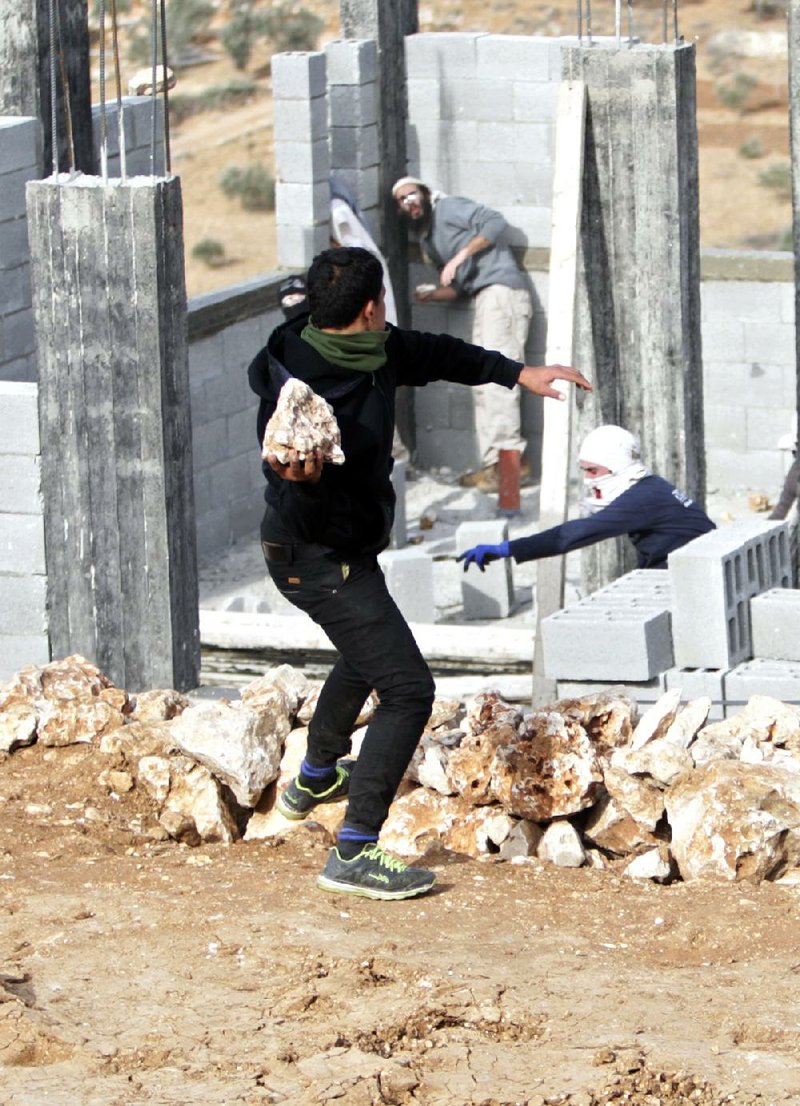KARYOUT, West Bank - Palestinians on Tuesday chased and grabbed more than a dozen Israeli settlers who witnesses said had attacked Palestinian farmers near a West Bank village.
The settlers were held for about two hours at a house under construction before being handed over to the Israeli military. During the standoff, the settlers huddled near a wall of the house, several bleeding from the head, and one was lying on the ground.
By the time Israeli soldiers arrived, the crowd surrounding the settlers had grown to about 200 people, an Associated Press photographer said. People kicked and spit at the settlers as they were led away by soldiers.
Human-rights groups have reported an increase in attacks by militant settlers on Palestinians and their property in the West Bank in recent years. However, Tuesday’s incident appeared to mark the first time settlers were captured and held by Palestinians.
The Israeli military said it had received word of a stone-throwing clash between settlers and Palestinian farmers and that it later evacuated 11 settlers with light and moderate injuries from the building.
The incident began about 10:30 a.m. near the West Bank village of Qusra, southeast of the city of Nablus, said Ziad Odeh, the Muslim prayer leader in Qusra and a member of the village council.
He said about 25 to 30 settlers, many of them masked, attacked Qusra farmers in an olive grove with sticks and stones, injuring a Palestinian boy’s head. A clash ensued, farmers called for reinforcements, and about 100 youths arrived from the village, Odeh said.
The settlers ran away and the villagers chased them, said Odeh and another witness, village resident Abdel Hakim Wadi.
They said several of the settlers sought cover in the building under construction on the edge of the village of Karyout, about 2½ miles from Qusra.
Villagers grabbed them however and turned the building into a holding area where they also put other settlers they chased down in the area, Odeh said.
Some of the settlers were tied up, and most had signs of beating injuries, the photographer at the scene said.
Odeh said the settlers involved in the attack on the Qusra farmers were in their late teens and 20s.
The military said the chain of events apparently began after Israeli authorities removed an illegally built structure in Esh Kodesh, a rogue settlement in the area.
In recent years, militant settlers have often responded to any attempts by the Israeli military to remove parts of dozens of rogue settlements, or outposts, by attacking Palestinians and their property.
The tactic, begun in 2008, is known as “price tag.”
Villages in the area repeatedly have been attacked by militant settlers, said Odeh, adding that assailants also set fire to four area mosques in the past three years.
A United Nations monitor said that from 2006 to August 2013, there were 630 settler-related attacks on Palestinians and 1,344 attacks on their property, with the pace of incidents rising since 2008. In all, 10 Palestinians were killed and 1,040 injured in such attacks, according to the U.N. Office for the Coordination of Humanitarian Affairs.
During the same period, 29Israeli civilians were killed and 368 injured by Palestinians in the West Bank, the office said.
In other developments Tuesday, a key political ally warned Israeli Prime Minister Benjamin Netanyahu that he would quit the coalition government if Israel recognizes its pre-1967 war frontier as a starting point for border talks with the Palestinians.
Such recognition is expected to be part of a proposed framework for a peace deal to be presented by U.S. Secretary of State John Kerry in coming weeks. Kerry returned to Washington on Monday after a mediating mission that included meetings with Netanyahu and Palestinian President Mahmoud Abbas.
The Palestinians want a state in the West Bank, Gaza Strip and east Jerusalem, lands Israel captured in 1967, but are ready to accept some modifications that would enable Israel to keep some of its settlements.
Netanyahu has refused to accept the 1967 frontier as a baseline for negotiations or consider a partition of Jerusalem - at least in public.
Earlier, the U.S. ambassador to Israel said Kerry’s framework proposal will be presented to both sides in a few weeks.
Dan Shapiro told Israel Radio that the proposal will include security arrangements, borders, Jerusalem and all the other “core issues.” Information for this article was contributed by Mohammed Daraghmeh and Karin Laub of The Associated Press.
Front Section, Pages 2 on 01/08/2014
